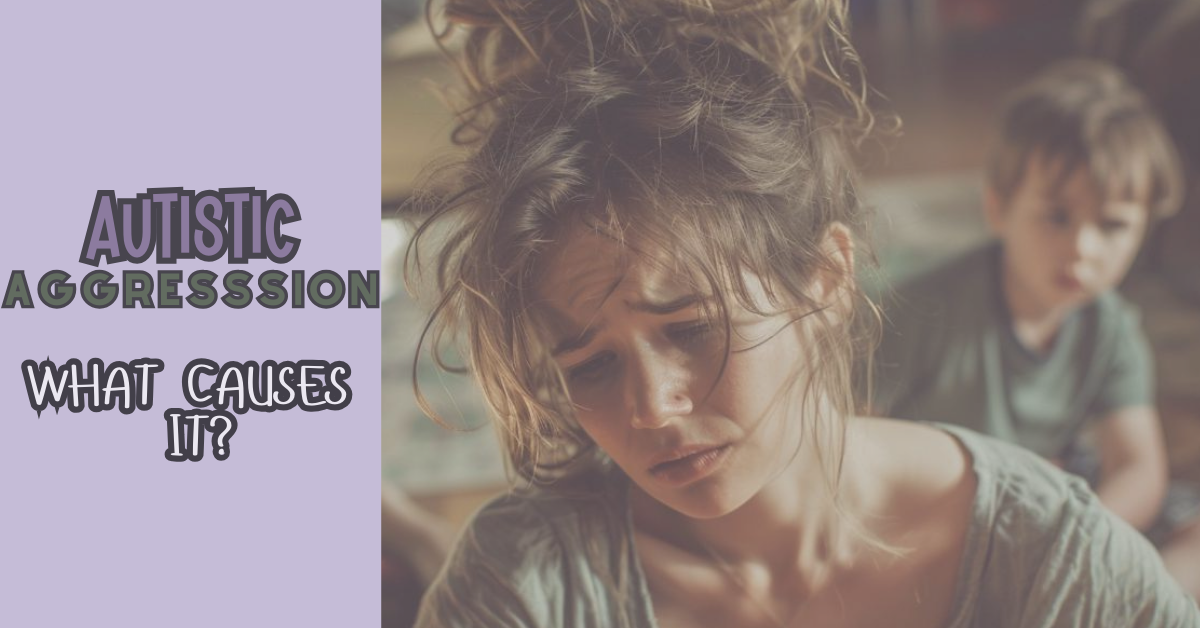Aggression in autistic children is a super common issue. This is especially true for children who are nonverbal or have trouble communicating. As the mother of a child on the spectrum, one of the most difficult things I’ve had to endure is my son channeling all of his aggression towards me. You find yourself asking one pretty big question: Why? Why is this happening? It helps to understand the connection between autism and aggression.
Why Are Children On The Spectrum Aggressive?
Aggression in children on the autism spectrum can be perplexing and distressing for parents. There are numerous factors that often contribute to these displays of aggression. Understanding the root causes of these disruptive behaviors is crucial to being able to address and redirect them effectively.
For my son, the inability to communicate is the cause of his aggression about 75-80 percent of the time. The other 20-25 percent typically occurs when he is in pain or doesn’t feel well. While these are not issues that typically generate aggressive behavior in neurotypical children, children on the autism spectrum, especially those who are completely nonverbal, like my son, face communication obstacles that, depending on the child, can lead to angry and explosive outbursts.
Let’s examine some of the potential issues that might be triggering aggressive behaviors in your child. Figuring out what is causing it is the key to curbing it.
Communication Difficulties
One of the primary reasons for aggression in autistic children is their struggle with communication. Many children on the spectrum have limited verbal skills, making it difficult for them to express their needs, wants, or discomforts. This inability to communicate effectively can lead to frustration, which often manifests as aggression. When a child is unable to articulate that they are hungry, tired, or overwhelmed, they may resort to physical outbursts as a way of signaling their distress.

The information in this post is solely for educational purposes and should not be considered medical advice. Please consult your primary physician regarding implementation of strategies or treatments for your child.
Sensory Overload
Children with autism frequently experience sensory processing issues. They can be hypersensitive to external stimuli such as sounds, lights, textures, or even smells. When a child is bombarded with an overwhelming amount of sensory input, their nervous system can become overloaded, leading to heightened stress and aggressive behavior. This response is self-defense, a way for the child to escape or manage the intense discomfort they are experiencing.
Sensory deprivation can really help with this. For my son, having access to a sensory room at school was crucial. At home, burying him under blankets to cut off his senses temporarily really helps. Noise cancelling headphones are also commonly used for this type of trigger.
Frustration and Anxiety
Frustration and anxiety are common among children on the spectrum. Many children on the autism spectrum have a strong desire for routine and predictability. Knowing the when’s, where’s and what’s of their daily routine gives them a sense of peace and control. When their environment is unpredictable or their routine is disrupted unexpectedly, it can cause significant anxiety. This anxiety, coupled with an inability to communicate their frustrations, can result in aggressive behavior. Additionally, children often become frustrated by their own limitations, whether in social interactions, learning, or daily activities, leading to outbursts.
Seeking Attention
Sometimes, aggression in autistic children is a means for a child to seek out attention from those around them. If a child feels neglected or unable to get positive attention through appropriate means, they may resort to negative behaviors to get a reaction. This is especially true if they have learned that aggression results in immediate attention, even if it’s not the positive kind they might ultimately want.
Attention seeking aggression is uncommon with children on the spectrum. The easiest way to determine if that is what is happening is to leave the room. If your child follows you to continue the outburst or stops when you leave the room, it is attention seeking. My son, for example, will continue his outburst whether I am in the room or not. This tells me he is not seeking attention.
Need for Control
Children with autism often feel a lack of control over their environment and their bodies. This can lead to feelings of helplessness and frustration. Aggression can be a way for them to assert control in a situation where they feel powerless. By lashing out, they are trying to create a sense of order and predictability in their world, even if it’s through negative means.
Physical Discomfort or Illness
Sometimes, aggression can be linked to physical discomfort or medical issues that the child is unable to communicate. Conditions such as gastrointestinal problems, headaches, or other pains can cause a child to act aggressively. Since they might not be able to verbalize their discomfort, their behavior becomes the primary way to express that something is wrong.
Personally, I cannot tell you the number of times we have gone to the doctor or hospital because my son had irritability we could not explain. If you can’t find the source, go to the doctor. My son has had an ear infection with zero symptoms of an ear infection. (Other than pain, which he communicated via aggression.) It was by taking him to the doctor for a check-up because I didn’t know what was causing his aggression that ultimately led to treating his ear infection. So, don’t be afraid to take your child to the doctor and ask for help. Just tell them your child is irritable, can’t communicate, and you want to make sure nothing is causing it.
Modeling Behavior
Children often mimic the behavior they observe in others. If they witness aggression in their environment—whether at home, at school, or in media—they might imitate these behaviors. Additionally, if they see that aggression results in a specific outcome (such as gaining control or receiving attention), they may adopt it as a strategy.
This is one of the big reasons why responding to an aggressive child on the spectrum by smacking their hand or spanking them is not the right approach. Unfortunately, it does not send the message you think it does and may actually condone them to be aggressive more often.
The Target Of The Aggression: Their Safe Space
Just using my situation as an example, my son is a massive mommy’s boy. I am his safe space. He comes to me first with all of his needs and he really doesn’t function well without me. (He actually can’t be away from me for extensive amounts of time as it results in massive panic attacks and meltdowns.) His aggression comes from being frustrated that he can’t communicate. And, because I am the person with the deepest connection to him, I, unfortunately, become the target of his aggression.
Emotionally, it is very hard to wrap your head around this. You find yourself wondering why someone who loves you is constantly trying to hurt you. You ask if you are doing something wrong. The truth is that aggression is targeted at you because of how much your child loves you. You are their safe space and they are desperately trying to communicate with you. They just aren’t sure how. They also understand that you are still going to be there regardless of how unsavory this type of expression can be because you, in turn, love them just as much.
It Will Be Alright
The most important thing to take away from all of this is that it will be alright. Don’t be afraid to lock yourself in a room to cry or scream into your pillow. Furthermore, don’t be afraid to call someone and ask for help. As important as it is for you to make sure your child is safe and healthy, your mental health and well-being are just as important. Self-care and surrounding yourself with a trusted support system is a must. Just remember that your child is struggling with this just as much as you are. Your child loves you and the last thing they would ever want to do is hurt you.
Understanding these underlying causes is the first step in addressing and managing aggression in autistic children. It’s important to remember that this behavior is not a reflection of your child’s feelings towards you, or your abilities as a parent, but rather a manifestation of their struggles. By identifying the triggers and implementing supportive strategies, you can help your child find healthier ways to communicate and cope with their environment.






















